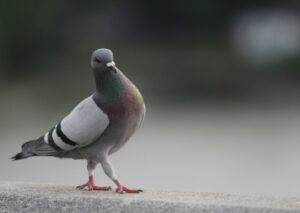
In major cities from San Francisco all the way to New York City, pigeons are a metropolitan staple. Whether people shoo them away or toss them their food scraps, these pesky birds are always around.
To the average city-dweller pigeons might be no more than an unavoidable nuisance, but for commercial property holders they can cause major problems. For hospitals and other healthcare facilities in particular, pest birds can be incredibly dangerous and should be immediately addressed by a professional and experienced pest control company. We’ll explain why.
A Popular Pigeon Destination
A hospital building has a multitude of places ideal for pigeon nesting and roosting. Pigeons frequently congregate on hospital rooftops, under parking garages, around loading docks and near outdoor eating areas. This gives the birds easy access to healthcare facilities, their employees, and perhaps most concerning, their patients.
A pigeon problem may be more challenging to tackle than you anticipate; once they’re around they’re hard to get rid of, as any urban citizen can attest. Pigeons breed rapidly and can become a sudden and overwhelming infestation.
Have you ever seen a bird flying around a mall? The same thing could happen in your hospital and endanger your patients, exposing them to potential fungi and bacteria. Where you find birds, you find their droppings—a breeding ground for disease. Fecal matter can infiltrate a hospital even if a bird doesn’t get inside, via a ventilation/airduct system or carried in by unsuspecting pedestrian shoes. Viruses and bacteria are carried not only in fresh droppings, but in dried ones as well, and even in the powder that may blow off of them and be displaced into your facility.
Protect your Patients
Hospitals and other healthcare institutions should be especially concerned about pest bird control because their consumers are their patients, who often have existing illnesses and conditions that make them more vulnerable to diseases that pigeons and their excrement can spread. Contaminated droppings can be a source for many potential infections with effects that range from mild to potentially fatal.
If a patient’s food comes into contact with pigeon droppings—possibly dried dropping powder that may undetectably blow onto meals consumed outside or through vents into the kitchen or cafeteria—they are susceptible to several forms of food poisoning; namely E. coli and Salmonellosis. Polluted droppings can also carry different types of fungus. Cryptococcosis is a fungus caused by yeast found in the intestinal tract of pigeons that manifests as a pulmonary disease and can further develop to affect the central nervous system. Another fungus transmitted by pigeons is called histoplasmosis, which grows in dried feces and causes a respiratory disease that can become fatal.
These are, of course, not the only potential illnesses that patients, visitors and personnel are exposed to in the presence of pest birds; they are also at risk for Saint Louis encephalitis, West Nile virus, candidiasis, mites, fleas and potentially many others.
Don’t risk the well-being of your patients, their families, your employees, or anyone else who may visit your hospital and come into contact with pigeons on your property.
At Birds Away/Pigeons Away not only do we provide preventative services and sanitary and humane pest solutions, we also thoroughly clean and remove existing debris and droppings that can be hazardous to you and your facility. Give us a call today, so you don’t have to worry about pigeons tomorrow.
